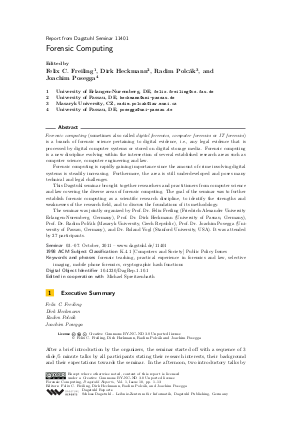Forensic Computing (Dagstuhl Seminar 11401)
Authors Felix C. Freiling, Dirk Heckmann, Radim Polcák, Joachim Posegga and all authors of the abstracts in this report
-
Part of:
Issue:
Dagstuhl Reports, Volume 1, Issue 10
Part of: Volume: Dagstuhl Reports, Volume 1
Part of: Journal: Dagstuhl Reports (DagRep) - License:
 Creative Commons Attribution-NonCommercial-NoDerivs 3.0 Unported license
Creative Commons Attribution-NonCommercial-NoDerivs 3.0 Unported license
- Publication Date: 2012-01-02
File

PDF
DagRep.1.10.1.pdf
- Filesize: 0.69 MB
- 13 pages
Document Identifiers
Subject Classification
Keywords
- forensic teaching; practical experience in forensics and law; selective imaging; mobile phone forensics; cryptographic hash functions
Metrics
- Access Statistics
-
Total Accesses (updated on a weekly basis)
0Document
0Metadata
Abstract
Forensic computing (sometimes also called digital forensics, computer forensics or IT forensics) is a branch of forensic science pertaining to digital evidence, i.e., any legal evidence that is processed by digital computer systems or stored on digital storage media. Forensic computing is a new discipline evolving within the intersection of several established research areas such as computer science, computer engineering and law. Forensic computing is rapidly gaining importance since the amount of crime involving digital systems is steadily increasing. Furthermore, the area is still underdeveloped and poses many technical and legal challenges. This Dagstuhl seminar brought together researchers and practitioners from computer science and law covering the diverse areas of forensic computing. The goal of the seminar was to further establish forensic computing as a scientific research discipline, to identify the strengths and weaknesses of the research field, and to discuss the foundations of its methodology. The seminar was jointly organized by Prof. Dr. Felix Freiling (Friedrich-Alexander University Erlangen-Nuremberg, Germany), Prof. Dr. Dirk Heckmann (University of Passau, Germany), Prof. Dr. Radim Polcàk (Masaryk University, Czech Republic), Prof. Dr. Joachim Posegga (University of Passau, Germany), and Dr. Roland Vogl (Stanford University, USA). It was attended by 27 participants.
Cite As Get BibTex
Felix C. Freiling, Dirk Heckmann, Radim Polcák, and Joachim Posegga. Forensic Computing (Dagstuhl Seminar 11401). In Dagstuhl Reports, Volume 1, Issue 10, pp. 1-13, Schloss Dagstuhl – Leibniz-Zentrum für Informatik (2012)
https://doi.org/10.4230/DagRep.1.10.1
BibTex
@Article{freiling_et_al:DagRep.1.10.1,
author = {Freiling, Felix C. and Heckmann, Dirk and Polc\'{a}k, Radim and Posegga, Joachim},
title = {{Forensic Computing (Dagstuhl Seminar 11401)}},
pages = {1--13},
journal = {Dagstuhl Reports},
ISSN = {2192-5283},
year = {2012},
volume = {1},
number = {10},
editor = {Freiling, Felix C. and Heckmann, Dirk and Polc\'{a}k, Radim and Posegga, Joachim},
publisher = {Schloss Dagstuhl -- Leibniz-Zentrum f{\"u}r Informatik},
address = {Dagstuhl, Germany},
URL = {https://drops.dagstuhl.de/entities/document/10.4230/DagRep.1.10.1},
URN = {urn:nbn:de:0030-drops-33691},
doi = {10.4230/DagRep.1.10.1},
annote = {Keywords: forensic teaching; practical experience in forensics and law; selective imaging; mobile phone forensics; cryptographic hash functions}
}
